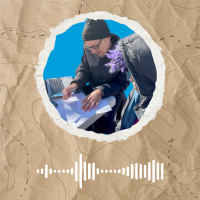Listen to the full interview below
Read time 4mins
This interview has been edited for length and clarity.
Joe: Hello and welcome, everyone. I'm Joe, part of the communications team here at Denver Public Library. Joining me today is Nate Stone, a Technology Education Administrator at Denver Public Library. Nate's work focuses on technology access and education at the library, from Digital Navigator programs to technology classes, all aimed at bridging the digital divide.
We'll also discuss the Community Technology Center (CTC) on the fourth floor of the Central Library, which will be an important hub for technology access in Denver. Let's get into the interview.
Joe: Can you start by explaining what digital inclusion means and why it's so important today?
Nate: Sure. Digital inclusion is all about ensuring that everyone has access to the technology and internet they need, regardless of factors like race, income, or where they live. It’s tied closely to digital equity, which is the goal we’re aiming for. Digital inclusion is the process—providing affordable internet, devices, and the skills people need to make the most of them. It’s essential because, in today’s world, so much happens online—jobs, education, healthcare. Without digital inclusion, people can get left behind.
Joe: How does Denver Public Library approach digital inclusion, and what are the goals?
Nate: The library has been involved in digital inclusion for years, even before it became a widely recognized issue. We’ve always provided internet and computer access as a core service. Our goals include ensuring everyone in Denver has the tools and knowledge they need to participate fully in the digital world. We loan out Chromebooks and hotspots so people can get online at home, and our Community Technology Center (CTC) offers classes and drop-in help. Our Digital Navigator program, which we started during the pandemic, provides 1-on-1 support to help people get connected and stay connected.
Joe: What kind of technology education programs does the library offer, and how do you ensure they are accessible and effective for people with different skill levels?
Nate: Our tech education programs are designed to meet people where they are. We offer everything from basic computer literacy classes to more advanced topics like digital security. Accessibility is a big focus for us. We make sure our programs are available in multiple languages and at different locations throughout the city. We’re also working on expanding our offerings at the CTC, especially as Central reopens with even more resources.
Joe: What are some future plans or innovations that Denver Public Library has around digital equity?
Nate: One of our biggest moves is making the Digital Navigators a permanent part of the library. This program has been incredibly successful in helping people get online and stay connected. We’re also planning to relaunch our tech classes at Central with a focus on the basics—things like computer skills, privacy, and security. The world has changed a lot in the last few years, so we’re adapting our programs to meet those changes.
Joe: What advice would you give other libraries when it comes to digital inclusion and equity?
Nate: Relationships are key. You can’t just focus on the technology itself; you need to build trust and understand the broader needs of the people you’re helping. Libraries are in a unique position to do this because we’re already trusted by our communities. It’s also important to be adaptable and willing to learn—technology changes fast, and so do the needs of the people we serve.
Joe: That wraps up my conversation with Nate about digital equity and inclusion at Denver Public Library. To learn more about the Community Technology Center, visit denverlibrary.org/ctc. Join us as we celebrate the reopening of Denver's Central Library in November 2024. A big thank you to Nate for sitting down with me for this interview. Thank you for tuning in, and we'll see you next time.
